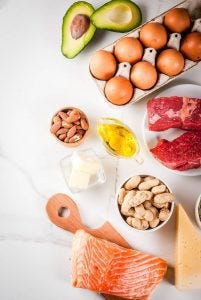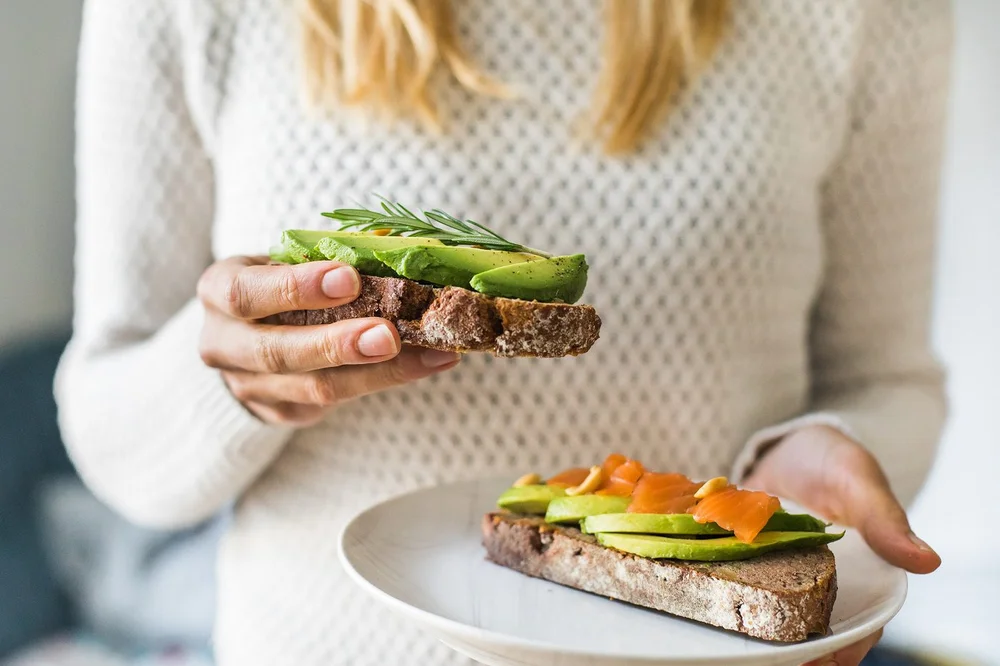Here Are Some of the Best Foods Rich in Healthy Fats
Medically Reviewed by Dr. Nicole Avena
Since approximately 60% of the human brain is fat, feeding your brain plenty of healthy fat is, you guessed it, a no-brainer.
Healthy fats play an important structural role in your brain cell membranes as well as a vital role in how your cells function.
The omega-3 essential fatty acid docosahexaenoic acid (DHA) is the most abundant omega-3 found in the brain and is important for maintaining nerve cell structure and function. Another omega-3, eicosapentaenoic acid (EPA), helps support mood and emotional balance.
Though we need plenty of healthy fats in our diet, many fail to get enough. Worse, they may eat too many foods with bad fats.
So, what makes a fat good or bad? Let’s take a look…
Bad Fats
Saturated Fats
Saturated fats naturally occur in red meat and full-fat dairy products. Since these fats are typically solid at room temperature, they’re often referred to as “solid fats.”
Consuming excessive foods with saturated fat can lead to an increase in the LDL cholesterol in your blood. This can lead to complications with various bodily systems including heart health. The American Heart Association recommends that only 5-6% of your daily calories should come from saturated fat.
Trans Fats
Trans fats are primarily found in processed foods that add hydrogen to vegetable oil. This makes the oil solid at room temperature, which allows foods to have a longer shelf life. Many restaurants use partially hydrogenated vegetable oil in their deep fryers because it can be stretched farther than some other oils.
Trans fats are frequently found in such foods as:
- Baked goods
- Microwave popcorn
- Fried foods
- Stick margarine
- Shortening
- Frozen pizza
- Nondairy coffee creamer
Trans fats can increase LDL cholesterol and decrease HDL cholesterol, which can lead to an increased risk of heart, brain, or other organ system issues.
Good Fats
Unsaturated Fats
Unsaturated fats remain in a liquid state at room temperature. The two main types are monounsaturated and polyunsaturated fats.
Monounsaturated Fats
These fats are in most animal fats, including beef, chicken, and pork. It’s recommended to eat lean sources of these meats, especially red meat, to avoid higher intakes of saturated fat. They also can be found in many oils, including canola, olive, safflower, and sunflower oils.
Polyunsaturated Fats
These fats are found in many seeds, including flaxseeds, pumpkin seeds, sesame seeds and sunflower seeds. Polyunsaturated fats are in many nuts, too, such as pine nuts and walnuts. Omega-3 fatty acids belong to this category of fats and are found in fatty fish such as herring, salmon, and sardines.
Eating these types of fats may help improve blood cholesterol levels.
Now that we’ve identified some good and bad types of fats, what are some of the best foods that contain good fats?
5 of the Best Foods Rich in Healthy Fats

Avocados provide a dynamic duo of healthy fat and fiber, which can help lower triglycerides. Most of an avocado’s fat is oleic acid, a monounsaturated fat also found in olive oil.
In one study, half the participants who ate an avocado-rich diet showed a 22 percent reduction in triglyceride levels. The fiber and fat help to support healthy blood sugar levels too, which is helpful for sustaining energy.
Eggs
Eggs are one of the most nutritious foods in the world. They have incredible nutritional balance and offer a wide variety of the many nutrients you need. Egg protein contains all nine essential amino acids that the body can’t produce on its own.
According to the Food Data Central database of the U.S. Department of Agriculture, a Grade A large chicken egg comes with generous amounts of protein and fat (much of which is healthy monounsaturated fat), and is low in calories and carbs. Here’s the impressive nutrition profile of eggs.
Nuts
If you’re worried about the fat content of nuts or that they’ll cause weight gain, don’t fret. Nuts contain healthy monounsaturated and polyunsaturated fats, rather than saturated fats found in foods like butter.
Almonds and cashews are an excellent source of protein, healthy fats, and fiber that can help balance blood sugar levels. They’re also packed with magnesium, a mineral that plays a key role in converting food into energy.
Walnuts have more plant omega-3 fats than other commonly consumed nuts such as peanuts and pistachios. Packed with protein and fiber, walnuts keep you full longer, so you won’t be as tempted to grab an unhealthy snack.
Salmon
Salmon is a fantastic source of healthy omega-3 fatty acids. Salmon is an abundant fish and is popular among fish-eaters. Getting plenty of the omega-3s in salmon can help your body make less triglycerides in the liver.
One review of clinical trials found eating fish that provided more than 1 gram of omega-3s a day was associated with improved (lower) triglyceride levels.
Seeds
Chia seeds and flaxseeds are full of plant-based protein to keep you satiated, fiber to support gut health, and omega-3 fatty acids that are important for heart health and optimal brain function, especially as we age. They’re easy to incorporate into smoothies, yogurt, or healthy baked goods.
Pumpkin seeds are delicious, especially when roasted. They’re a treasure trove of nutrition as well – loaded with vitamins, minerals, antioxidants, fiber, healthy fats, and protein. They support health in many ways including promoting healthy immune function as well as blood flow, blood pressure, and blood sugar.
Embrace Healthy Fats
Key takeaway: not all fats are bad.
It’s recommended that you eat an abundance of good fats to support your health, such as nuts, seeds, and cold-water fish rich in omega-3s like wild salmon and sardines.
Be sure to add these healthy fats to your diet.
Also, try to minimize your intake of saturated fats and skip trans fats altogether.
Healthy eating!
At BrainMD, we’re dedicated to providing the highest purity nutrients to improve your physical health and overall well-being. For more information about our full list of brain healthy supplements, please visit us at BrainMD.
- This Is What You Need to Know About HBOT
Medically Reviewed by Dr. Nicole Avena - April 22, 2024 - Hormone Changes in Men: How to Know If You Have Low Testosterone! - April 15, 2024
- This Is What You Need to Know About EMDR Therapy! - April 11, 2024



